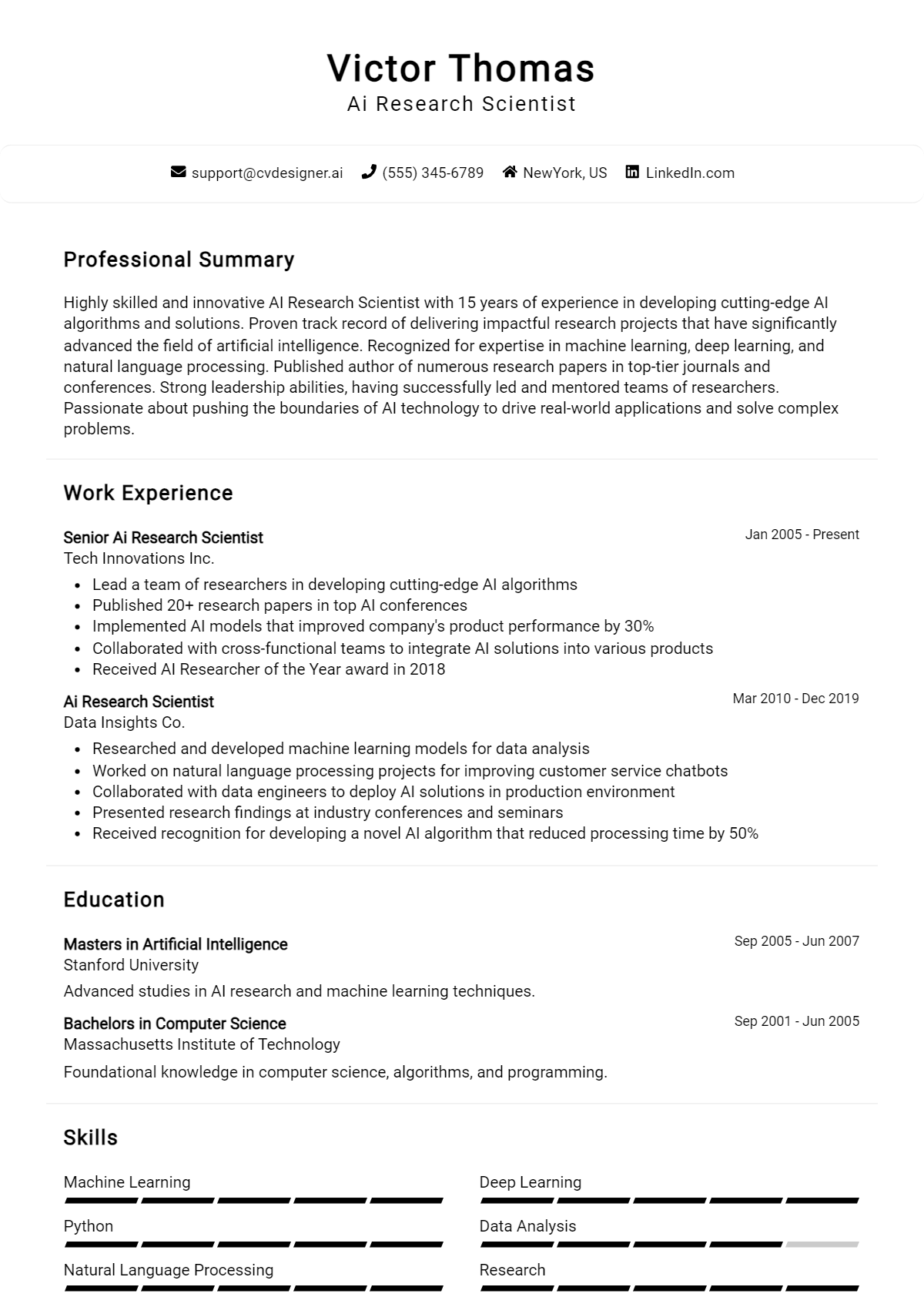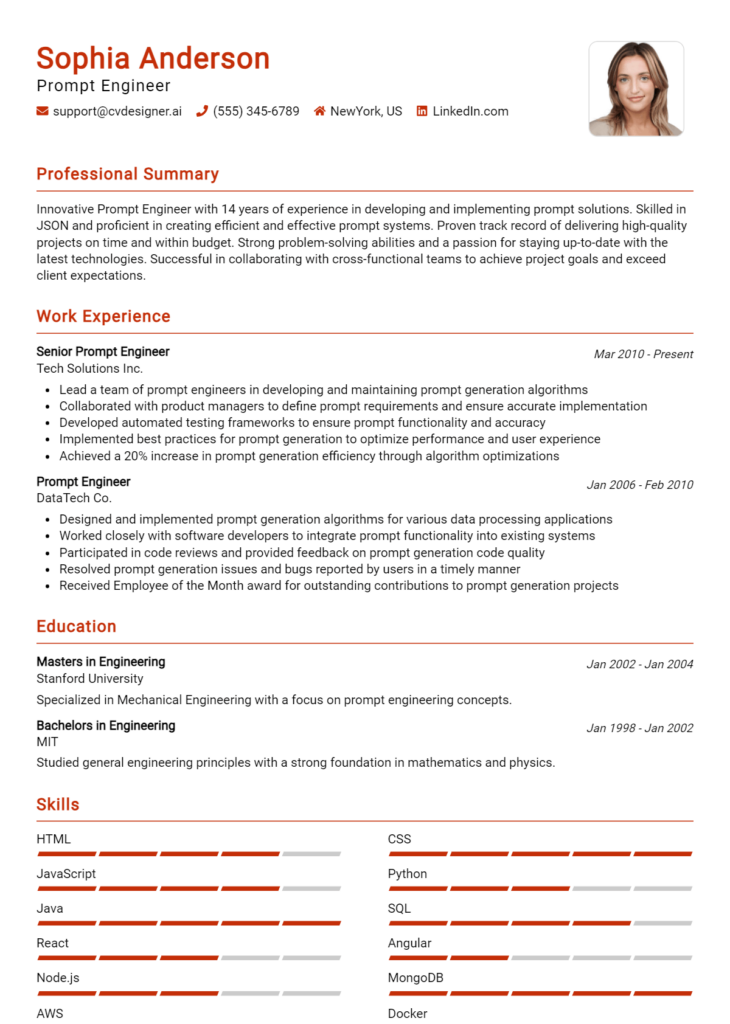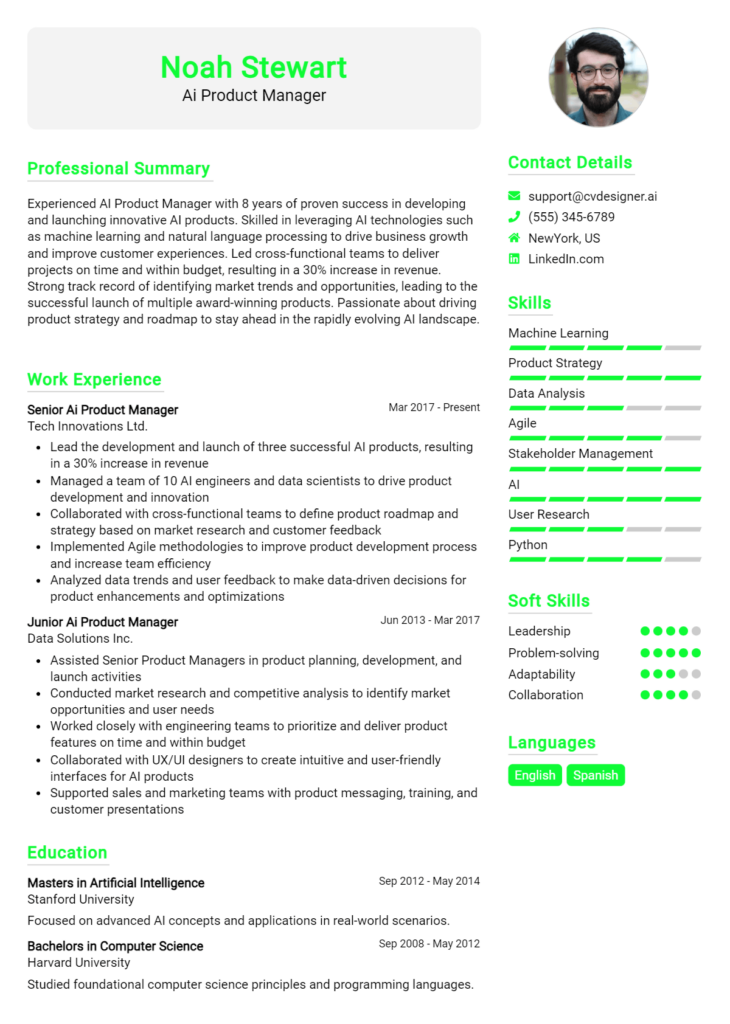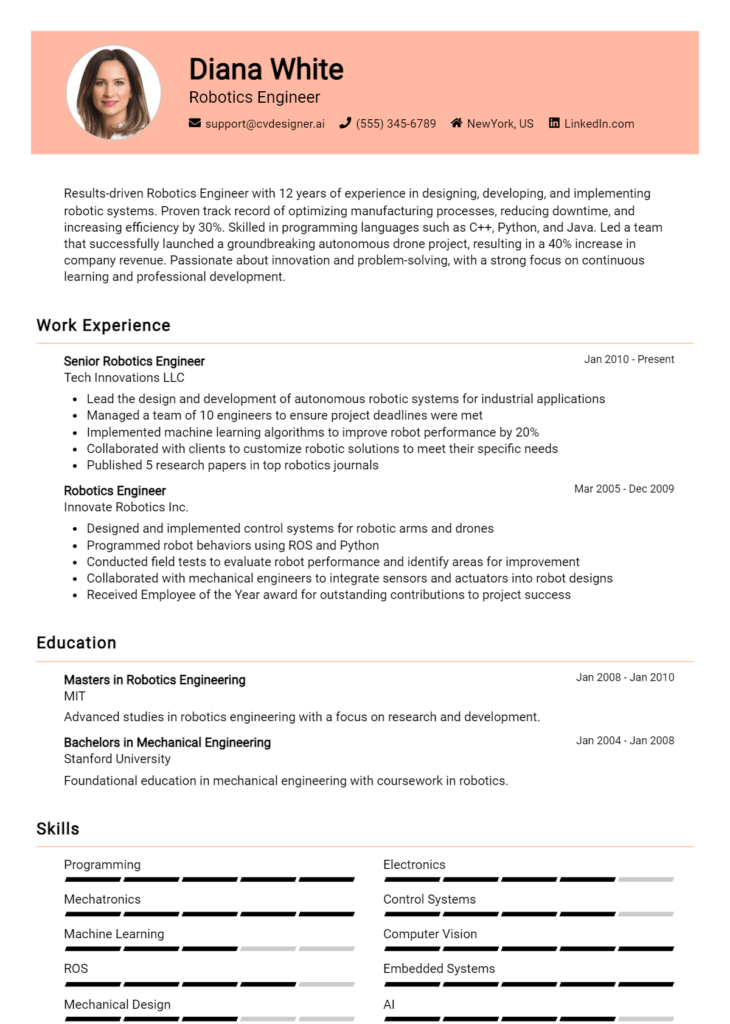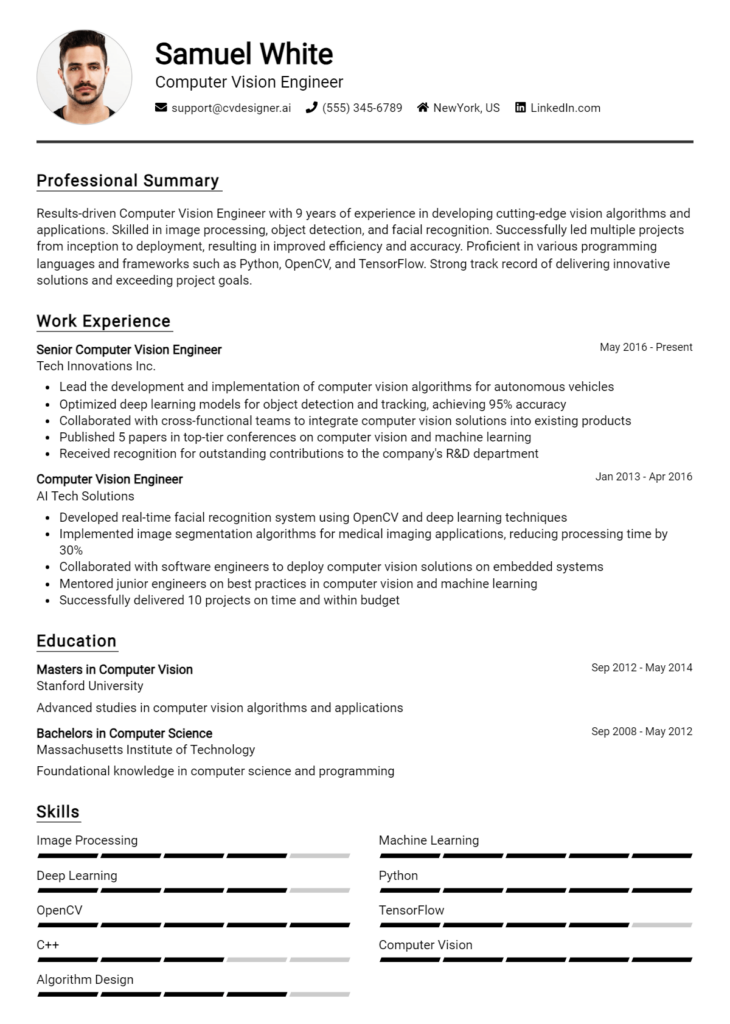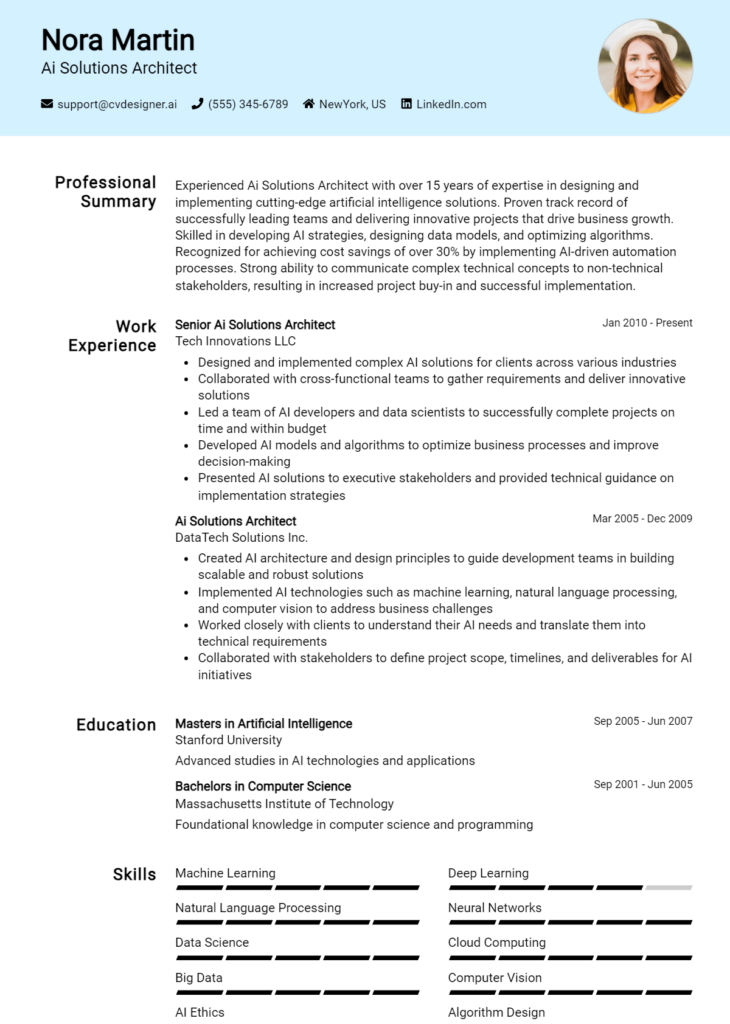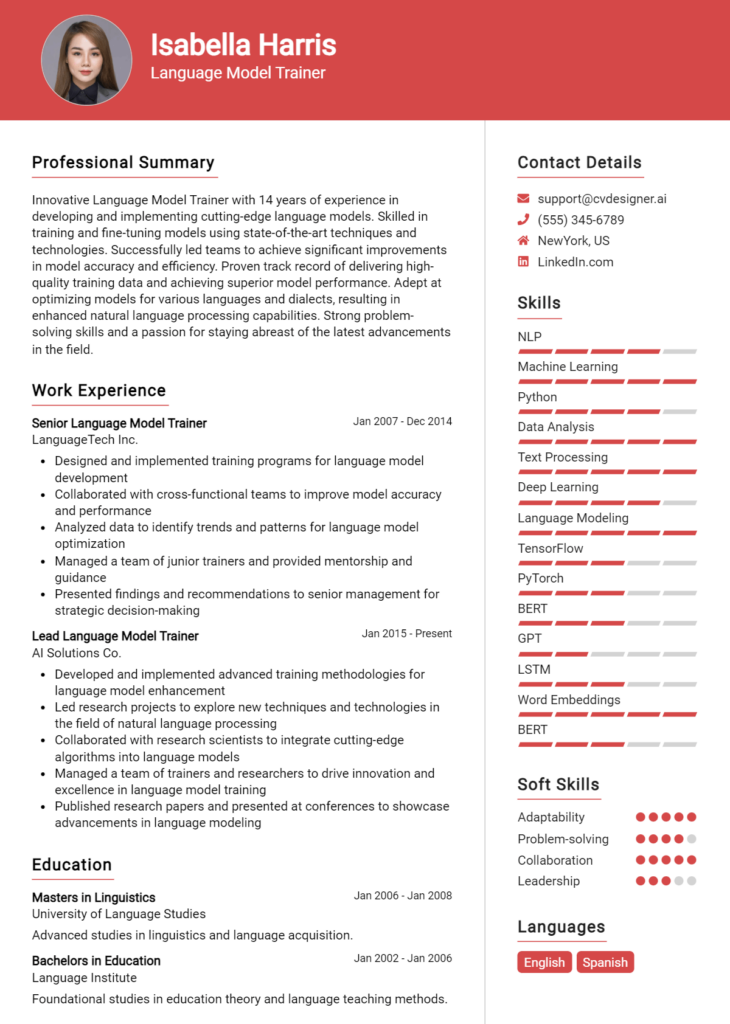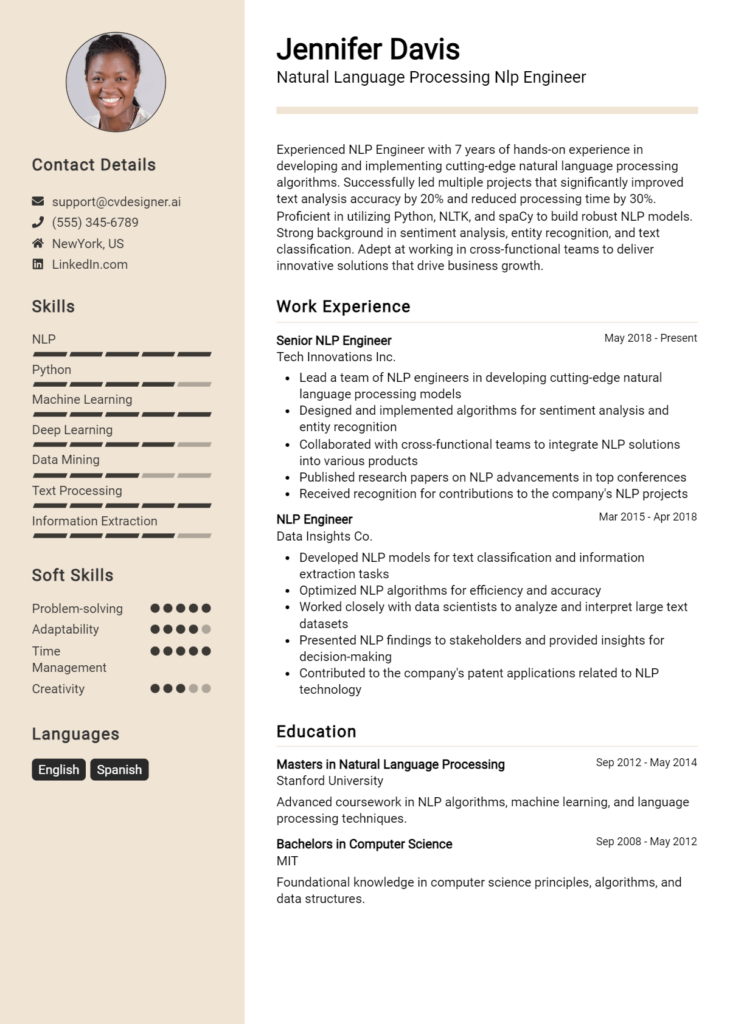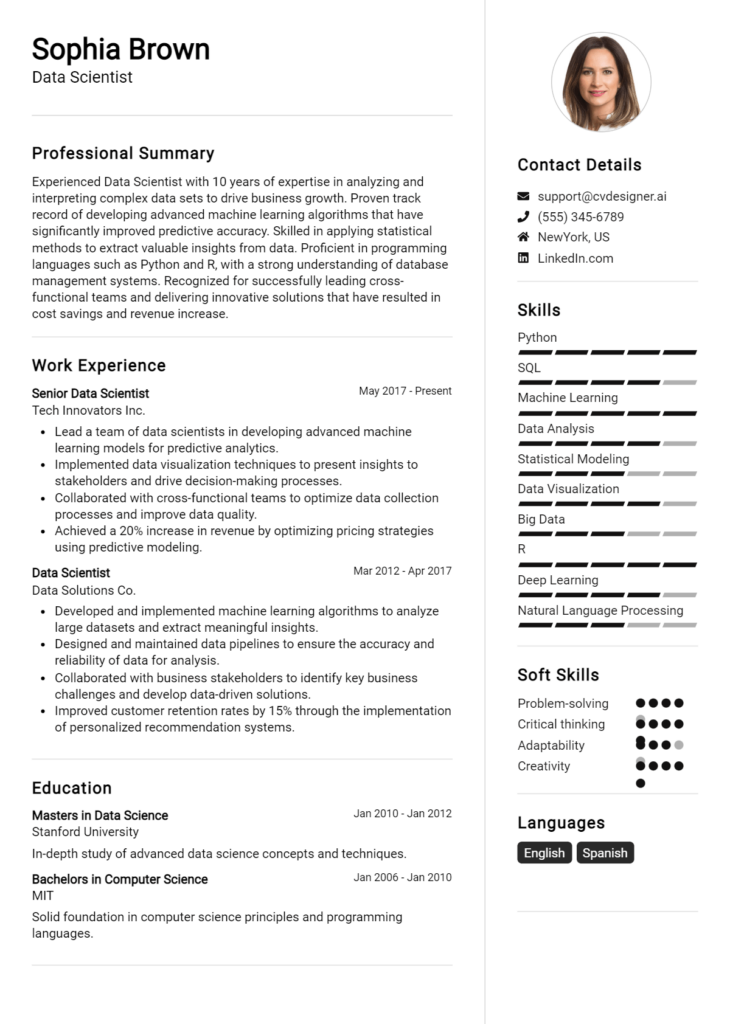Most Popular Ai Research Scientist Resume Examples
Explore additional Ai Research Scientist resume samples and guides and see what works for your level of experience or role.
The role of an AI Research Scientist is at the forefront of technological innovation, shaping the future with groundbreaking advancements in artificial intelligence and machine learning. As organizations increasingly turn to AI to solve complex challenges, the demand for skilled professionals in this field is soaring. However, in a competitive job market, a well-crafted resume is essential to stand out and secure that coveted interview. It serves as your personal marketing tool, showcasing not just your qualifications but also your passion for the field. An effective resume can be the difference between landing your dream job and being overlooked.
In this comprehensive guide, we will delve into the key components of crafting an impactful AI Research Scientist resume. You'll learn about the specific responsibilities and essential skills that hiring managers are looking for, as well as the best resume formats to use to highlight your strengths. We will also discuss common mistakes that candidates make and how to avoid them, ensuring your application shines. Additionally, we will provide resume examples tailored for various experience levels, along with expert tips on the resume writing process and advice on selecting the right resume templates to enhance your presentation. Whether you're a seasoned professional or just starting your career, this guide is designed to equip you with the tools and insights needed to create a standout resume that propels you toward your next career opportunity.
Key Responsibilities and Skills for a AI Research Scientist
As an AI Research Scientist, your primary focus is to advance the field of artificial intelligence through innovative research, development of algorithms, and the application of AI techniques to solve complex problems. Here are the key responsibilities associated with this role:
- Conduct research in machine learning, deep learning, natural language processing, or computer vision.
- Design, implement, and evaluate AI models and algorithms.
- Collaborate with cross-functional teams to integrate AI solutions into projects.
- Publish research findings in reputable journals and present at conferences.
- Stay updated with the latest advancements in AI and contribute to the academic community.
- Mentor junior researchers and participate in knowledge-sharing initiatives.
- Analyze large datasets to extract meaningful insights and improve existing models.
To excel as an AI Research Scientist, certain skills are essential:
- Strong programming skills in languages such as Python, Java, or C++.
- Proficiency in machine learning frameworks like TensorFlow, PyTorch, or Keras.
- Solid understanding of statistics and mathematics, particularly in probability and linear algebra.
- Experience with data preprocessing, analysis, and visualization techniques.
- Familiarity with cloud computing platforms and big data technologies.
- Excellent problem-solving and critical-thinking abilities.
- Strong communication skills to effectively relay complex concepts to non-technical stakeholders.
When crafting your resume, it is crucial to highlight these skills effectively in the resume skills section. Tailoring your responsibilities and skills to the specific job description will enhance your chances of standing out to potential employers. Additionally, consider how these skills could be relevant in creating a strong CV that reflects your unique qualifications and experiences in the field of AI research.
Best Resume Format and Structure for a AI Research Scientist
When crafting a resume for an AI Research Scientist position, it’s important to choose a format that highlights your technical expertise, research experience, and academic credentials effectively. Here’s a detailed guide on the best resume format and structure to help you attain that goal.
Contact Information
- Start with your full name at the top, followed by your professional title, if applicable (e.g., AI Research Scientist).
- Include your phone number, professional email address, and LinkedIn profile or personal website.
- Ensure all information is up-to-date and clearly presented.
Professional Summary
- Write a concise summary (3-4 sentences) that captures your experience, areas of expertise, and what you bring to the role.
- Tailor this section to highlight your knowledge in AI methodologies, programming languages, and any specific technologies (like TensorFlow, PyTorch, etc.) relevant to the position.
- Emphasize your research focus, notable achievements, and career aspirations in AI.
Work Experience
- List your work experience in reverse chronological order (most recent first).
- For each position, include your job title, the company name, location, and dates of employment.
- Use bullet points to describe your responsibilities and achievements, focusing on quantifiable outcomes (e.g., "Developed a machine learning model that improved prediction accuracy by 20%").
- Highlight collaborative projects, publications, or research grants that demonstrate your contribution to the field.
Education
- Include your highest degree first, followed by the name of the institution, location, and graduation date.
- Mention any relevant coursework, honors, or thesis topics, especially those directly related to AI and machine learning.
- If you have a PhD, ensure it is prominently displayed, as it is often a requirement for research positions.
Skills
- List relevant technical skills, such as programming languages (Python, R, C++), machine learning techniques, data analysis tools, and software frameworks.
- Include soft skills that are pertinent to research roles, like problem-solving, critical thinking, and collaboration.
- You can categorize skills into ‘Technical Skills’ and ‘Soft Skills’ for better readability.
Certifications
- Mention any relevant certifications that enhance your qualifications, such as those from platforms like Coursera, edX, or specialized AI certifications.
- Include the name of the certification, issuing organization, and date obtained.
Additional Sections (Optional)
- Publications: If you have published papers, include a section that lists them in a standard citation format.
- Conferences: Mention any relevant conferences you’ve participated in, either as a speaker or a participant.
- Projects: Briefly describe any significant projects that showcase your practical application of AI concepts.
Complementing Your Cover Letter
To create a cohesive application package, ensure that your resume format complements your cover letter format. Both documents should share similar design elements, such as font style, size, and color scheme, to present a unified professional image. Use the cover letter to elaborate on key experiences and skills mentioned in your resume, providing context and personal anecdotes that demonstrate your passion for AI research. Tailoring both documents for the specific job you are applying for will significantly enhance your appeal to potential employers.
By following this structured approach, you'll create a comprehensive and visually appealing resume that effectively communicates your qualifications as an AI Research Scientist.
Writing Tips and Best Practices for a AI Research Scientist Resume
When crafting a resume as an AI Research Scientist, it's crucial to present your skills and accomplishments in a clear, concise, and compelling manner. Begin by tailoring your resume to highlight relevant experience, emphasizing your expertise in machine learning, data analysis, and programming languages. Use action verbs to convey your contributions effectively, and quantify your achievements to illustrate your impact within previous roles. Incorporate industry-specific keywords to improve visibility in applicant tracking systems, ensuring your resume resonates with hiring managers in the tech field. Don't forget to utilize resume writing tips to enhance the overall professionalism of your document. Additionally, remember that many of these practices can also be applied to your cover letter, making your application even more compelling.
- Use action verbs such as "developed," "implemented," and "analyzed" to convey your responsibilities and achievements.
- Quantify your results, for example, by stating how much you improved model accuracy or reduced processing time.
- Incorporate industry-specific keywords like "deep learning," "neural networks," and "NLP" to align with job descriptions and enhance searchability.
- Tailor your resume for each job application, emphasizing the most relevant experience and skills for the specific position.
- Highlight any publications, patents, or presentations to demonstrate your contribution to the field and recognition by peers.
- Include relevant technical skills and tools, such as TensorFlow, PyTorch, or R, to showcase your proficiency in essential technologies.
- Keep your formatting clean and professional, using bullet points for easy readability and maintaining a consistent style throughout.
- Limit your resume to one or two pages, focusing on the most relevant and impactful information to capture the hiring manager's attention.
Common Mistakes to Avoid in a AI Research Scientist Resume
When crafting a resume for the role of an AI Research Scientist, it is crucial to present your qualifications and experiences in a clear and compelling manner. However, many candidates make common mistakes that can detract from their expertise and ultimately affect their chances of landing an interview. To ensure your resume stands out, be mindful of the following pitfalls:
- Overloading the resume with excessive information, making it difficult for hiring managers to identify key qualifications.
- Using generic descriptions that fail to highlight specific skills or achievements relevant to AI research.
- Neglecting to tailor the resume for each job application, which can make your experience appear less relevant.
- Including irrelevant work experiences that do not contribute to your qualifications as an AI Research Scientist.
- Failing to quantify achievements with data or metrics, which can illustrate the impact of your work.
- Using jargon or technical terms without explanation, which may confuse readers who are not familiar with specific technologies.
- Ignoring the importance of formatting and organization, leading to a cluttered and difficult-to-read document.
- Listing skills without demonstrating how they have been applied in past roles, making them seem less credible.
- Not proofreading for grammatical errors or typos, which can create an unprofessional impression.
- Overlooking the importance of including a strong summary statement that effectively conveys your career goals and expertise.
To avoid these errors, consider reviewing the common mistakes to avoid in a resume as a helpful guide. Additionally, don't forget to pay attention to your cover letter; it’s equally important to avoid common cover letter mistakes that could undermine your application.
Sample AI Research Scientist Resumes
As the demand for artificial intelligence continues to grow across various industries, the role of an AI Research Scientist has become increasingly vital. These professionals are tasked with developing algorithms, conducting experiments, and analyzing data to push the boundaries of AI technology. Below are three sample resumes representing different levels of experience and backgrounds: one for an experienced professional, one for an entry-level candidate, and one for a career changer. These examples can serve as a guide to help you craft your own resume tailored to the AI field.
Sample Resume 1: Experienced AI Research Scientist
John Doe
123 AI Lane
San Francisco, CA 94105
(123) 456-7890
john.doe@email.com
Summary
Innovative AI Research Scientist with over 8 years of experience in machine learning, natural language processing, and deep learning. Proven track record of developing state-of-the-art algorithms and models that enhance user experience and drive business results. Excellent communicator with a strong ability to collaborate with cross-functional teams.
Education
Ph.D. in Computer Science
Stanford University, Stanford, CA
Graduated: May 2015
M.S. in Artificial Intelligence
University of California, Berkeley, CA
Graduated: May 2012
Experience
Senior AI Research Scientist
Tech Innovations Inc., San Francisco, CA
June 2017 - Present
- Led a team of researchers in developing a machine learning model that improved predictive analytics by 30%.
- Published 10+ papers in top-tier AI conferences and journals, contributing to advancements in neural network architectures.
- Collaborated with product teams to integrate AI solutions, resulting in a 20% increase in customer satisfaction.
AI Research Scientist
Data Solutions LLC, San Jose, CA
June 2015 - May 2017
- Developed algorithms for natural language processing tasks, achieving state-of-the-art results on multiple benchmarks.
- Conducted experiments and analyzed large datasets, providing actionable insights that informed product development.
- Mentored junior researchers and interns, fostering an environment of knowledge sharing and innovation.
Skills
- Machine Learning, Deep Learning, Natural Language Processing
- Python, TensorFlow, PyTorch
- Data Analysis, Statistical Modelling
Sample Resume 2: Entry-Level AI Research Scientist
Emily Smith
456 Learning Ave
Austin, TX 78701
(234) 567-8901
emily.smith@email.com
Summary
Motivated and detail-oriented AI Research Scientist with a strong foundation in machine learning algorithms and data analysis. Recently completed a Master's degree in Computer Science with a specialization in Artificial Intelligence. Eager to contribute to innovative projects and grow in a dynamic research environment.
Education
M.S. in Computer Science, Specialization in AI
University of Texas, Austin, TX
Graduated: May 2023
B.S. in Computer Science
University of Texas, Austin, TX
Graduated: May 2021
Experience
Graduate Research Assistant
University of Texas, Austin, TX
September 2021 - May 2023
- Assisted in the development of machine learning models for image classification tasks, contributing to research publications.
- Conducted experiments using Python and TensorFlow, analyzing results to improve model accuracy.
- Presented findings at university research symposiums, developing strong presentation and communication skills.
Intern, Data Science
InnovateTech, Austin, TX
June 2022 - August 2022
- Collaborated with a team to analyze large datasets, implementing machine learning techniques to derive insights.
- Assisted in the development of predictive models, enhancing the accuracy of company forecasting tools.
Skills
- Machine Learning, Data Analysis
- Python, R, TensorFlow
- Strong Analytical and Problem-Solving Skills
Sample Resume 3: Career Changer to AI Research Scientist
Mark Johnson
789 Transition Dr
New York, NY 10010
(345) 678-9012
mark.johnson@email.com
Summary
Results-driven professional transitioning to AI Research Scientist with 5 years of experience in software development and a passion for artificial intelligence. Skilled in programming and data analysis, with a strong desire to leverage technical skills to innovate in AI research.
Education
Certificate in Artificial Intelligence
Coursera, Online
Completed: August 2023
B.S. in Computer Engineering
University of New York, New York, NY
Graduated: May 2018
Experience
Software Developer
Tech Solutions Corp., New York, NY
June 2018 - Present
- Developed software applications using Python and Java, focusing on data processing and analysis.
- Collaborated with data scientists to implement machine learning algorithms in production environments.
- Enhanced software performance by optimizing algorithms, leading to a 15% increase in efficiency.
Projects
- Developed a personal AI chatbot using NLP techniques, enhancing user interaction through machine learning.
- Completed a capstone project on predictive modeling for stock market trends, resulting in a comprehensive report and presentation.
Skills
- Programming (Python, Java)
- Machine Learning Fundamentals
- Data Analysis, Software Development
Explore more resume examples for inspiration as you prepare your application. Additionally, don’t forget to consider corresponding cover letter examples to create a complete job application package.
Checklist for a AI Research Scientist Resume
- Proofread for Errors: Carefully review your resume for any spelling, grammar, or punctuation errors. Consider using tools like Grammarly to assist with proofreading.
- Check Consistency: Ensure that your formatting is consistent throughout the document. This includes font size, style, bullet points, and spacing.
- Tailor for the Job: Customize your resume for the specific AI Research Scientist position you are applying for. Highlight relevant skills, experiences, and projects that align with the job description.
- Highlight Key Skills: Clearly list your technical skills relevant to AI research, such as programming languages (Python, R), machine learning frameworks (TensorFlow, PyTorch), and relevant tools or technologies.
- Quantify Achievements: Where possible, include quantifiable achievements in your work experience. Use numbers to demonstrate impact, such as “Improved model accuracy by 20%” or “Published 3 research papers in peer-reviewed journals.”
- Include Relevant Projects: Feature significant research projects or publications that showcase your expertise and contributions to the field of AI.
- Professional Summary: Ensure your professional summary reflects your skills and career goals concisely. It should capture the attention of recruiters and provide a snapshot of your qualifications.
- Contact Information: Verify that your contact information is up to date and clearly presented at the top of your resume, including your LinkedIn profile or personal website if applicable.
- Use an AI Resume Builder: Consider using an AI resume builder to ensure all elements are well-organized and visually appealing.
- Follow a Similar Checklist for CV: Remember that a similar checklist can be followed for creating a CV to ensure it meets academic and professional standards.
Key Takeaways for a AI Research Scientist Resume Guide
In conclusion, crafting a compelling resume as an AI Research Scientist requires a strategic approach that highlights your technical skills, research experience, and contributions to the field. By utilizing the examples and tips provided, you can create a strong resume that stands out to potential employers and showcases your expertise. To take the next step in your job application process, consider downloading a tailored resume template from resume templates or enhancing your application with a personalized cover letter using our cover letter templates. For a more streamlined experience, our best resume maker can help you design a professional document that reflects your qualifications and aspirations. Start building your future today!
